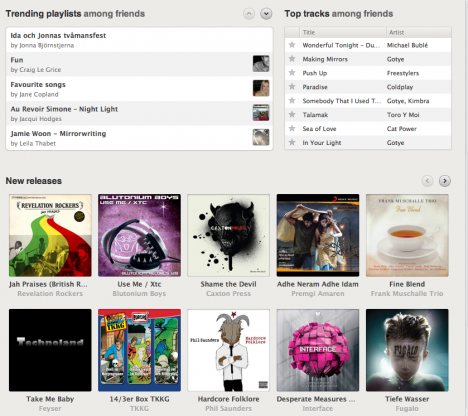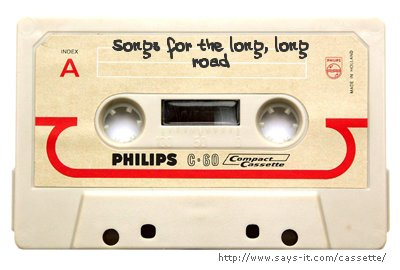Why Spotify will be worth the wait
Spotify is a web platform that allows users to stream music, offering a real time, no-buffering-required listening experience of a vast back catalogue of music. It makes it easy to listen to millions of tracks on your desktop or on mobile, and crucially it makes sharing those songs and discovering new ones a seamless experience.
I’d argue it offers a way of connecting with music fans that other platforms, advertisers and record labels themselves have lost. And it’s timely – the overall global music market decline is at around 3%, sitting at $16.2bn last year. Shortlisted for Best Overall Startup of 2011 by Techcrunch, Spotify is claiming 12 million subscribers, three million of whom are paying to skip ads or download content to mobile thanks to Spotify’s various payment tiers. Obviously that’s not straight profit for Spotify; it means a return for the labels who have licenced their archives of music, and it means a return for advertisers who benefit from targeting users via demographic data as well as by music genre.
According to Kate Vale, new MD of Spotify Australia, the audio ad has been very effective for brands elsewhere, “they work incredibly well to target highly engaged listeners. Jaguar in the UK targets men aged between 35-50 who listen to classical jazz, and that works extremely well for them.”
 Another reason for this engagement is the crucial element of discoverability. Unlike iTunes, Spotify’s open nature means users can compile playlists and share them easily. Spotify’s social dimension is paramount; the Facebook and Twitter integration is genuinely very smooth, and means that you can create connections and share music with anyone. It offers a Pandora style radio station function that generates playlists based around a particular artist, but the main focus is on what my friends are listening to. I very much enjoy the eclectic selections that iTunes Genius offers me, but this is only a juxtaposition of records I already own plus suggestions created by an algorithm, whereas I primarily look for recommendations about new music from people I know and trust.
Another reason for this engagement is the crucial element of discoverability. Unlike iTunes, Spotify’s open nature means users can compile playlists and share them easily. Spotify’s social dimension is paramount; the Facebook and Twitter integration is genuinely very smooth, and means that you can create connections and share music with anyone. It offers a Pandora style radio station function that generates playlists based around a particular artist, but the main focus is on what my friends are listening to. I very much enjoy the eclectic selections that iTunes Genius offers me, but this is only a juxtaposition of records I already own plus suggestions created by an algorithm, whereas I primarily look for recommendations about new music from people I know and trust.
It’s open and syncs easily with the social web, and gives us that feeling of serendipitous discovery that reminds me of the heady days of the mixtape.




“The cost to the music industry per pirated song is $150,000, which means the iPod Classic, holding 40,000 songs has cost an an equivalent of $8bn dollars in damage”
What a load of rubbish!
And Rdio has been out for ages and is pretty great, I had Spotify in the UK and Rdio is just as good.
no shit sherlock
I give it 2 weeks before I’m bored of people using ‘serendepity’ in every feature, email, post, contribution…
In other news, Spotify is the best music resource in the world, period.
This is a little misinformed. You guys should know better than to quote piracy statistics. They are irrelevant. A pirated copy DOES NOT mean a sale. These are the people who claimed during sopa a month or so ago that piracy was costing the US something like $100B which was larger than the size of the entire entertainment industry.
Please research these statistics before quoting them. The numbers need to be scrutinised.
If this is the panacea to the music industry, then artists are well and truly screwed.
Lady Gaga received $167 in royalties for 1Million plays of poker face. Spotify dispute this figure but don’t talk about any artists making some decent money from spotify. There was an AMAZING infographic about a year or two ago about how many times your song would have to be played on an online service to achieve a US minimum wage.
Its a jawdropping number. You needed Millions (or Billions) of plays a week.
If artists cant make an income from these services the business model is broken. Not saying that wont be a great marketing channel, and that artists will make their money through merch and tickets.
Spotify is probably going to change the economics of the music industry back to the way it was before the big labels had all the power. Just follow the money.
This is great news for Australia
@Rob
‘Period’ ? What time is it in California ?
You may want to watch Rob Reid again to see how much of his ‘compelling argument’ is actually serious.
@Wade. Yes figured it was a tongue in cheek dig. Don’t have speakers at work so cant listen to it, but got the gist that he may have been taking the piss with his comments.
What about rdio.com – its been in Australia for about a month now and there doesn’t seem to be anything unique about Spotify? Ive been using rdio and it has all the above – and ive discovered some great music too.
I think it may come down to which ever platform has more connections/friends on it though – that’s the key ingredient to social isnt it?
Hopefully Spotify will challenge Apple iTunes pricing…..USD$9.99-$12.99 for a new release album (US Store) vs AUD$16.99-$24.99 (Australian Store) is daylight robbery and they know it.
iTunes is often more expensive than buying the traditional CD from JBHIFI or Big W!
Time to Spotify a bit of reality Apple.
I’d suggest that most of the delay is trying to thrash out bandwidth agreements with the ISP’s and mobile telcos here in Oz. Your Spotify ain’t going to go very far at 100mb per hour. Corporate networks, beware when you’ve got 30 people all listening to their own Spotify all day.
rdio has been here for a while.
Why all the fuss about Spotify?
@Pomstar
Think I got a bit carried away in my serendipitous rant. next time I’ll go for something more suitable like Full Stop, or Over, or Roger…
ok, we get it: great for the major labels and great for brands. connect mainstream music to lazy consumers, with the major labels being primary benefactors (and pitance in royalty percentage per play to the artist) therefore nothing more than pay-as-you-go online radio. advertisers get a cozy 12M-strong audience to plunder (who’s the pirate now?). just a new product in the playing field for the majors to attempt at reasserting their loosening stranglehold and a new platform for monetisation. great news for brands; irrelevant to music. ps: new mix tape straight into ur inbox real soon cathie! xxx 😉
Spotify will be great, but – having been testing it for a week now, I can tell you it lacks the same things most streaming music services lack – All rights – there are missing key tracks, key albums, and it really shows when you try to search for that elusive song.
You deal with it, you live with it, but in terms of Spotify vs Rdio for example, Rdio is ahead in my book in terms of web and mobile app, and both are on par in terms of rights aquisitions.
The hype about Spotify is the brand, it is well known and there is a ‘buzz’ about it, but they need to nail it first go. We shall see!
You seem to forget that its the artist that’s getting screwed here!!
Rdio vs Spotify ??
Who gives a shit!!
How about actually paying the artist for their works, rather than being spoon fed like we have been through ITunes, and now we have a subscription based platform that seems to think its a radical way of accessing music and will change the way the music industry exists…
RUBBISH & LAZY!
The only new platform that I know that still flies the flag for the independent and undiscovered musician is The Holding Pattern http://www.holdingpattern.com
Every other site seems to be a bastardised version of a dying environment where the labels have their input and screw the artist a little more…cause they can!
THP allows for a free marketplace for artists to decide their price, and also allow creatives access to this music for public broadcast…and whats awesome as a music die hard.
It allows fans to search through a Visualiser…retaining the element of search and discovery…it’s super cool, and fun!
Artists take 80% of all sales…not some miniscule percentage drip fed to them by a subscription based platform owned by record labels..
Get with the program!! Its not about you!!!…Its about the artists…if you cared !?!?
Thanks Nick. I just checked out The Holding Pattern as per your recommendation above. Really interesting. I’m all for artists actually making money from their work.
However, I find that the Visualiser is just poor use of Flash trends from yesteryear with bad usability. So it’s not really cool, or fun.
If this is right it’s a tough environment.
http://www.informationisbeauti.....rn-online/
There is no doubt artists are getting screwed, why else are our concert halls being filed with Rod Stewart, Earth Wind and Fire, Steve Winwood, Lionel Richie etc. They no longer make albums but best ofs… These guys don’t really want to get out and tour, they’re pensioners. They HAVE to tour as they no longer make royalties off their music. How can we pay these guys so they stop touring?
Pirate Bay still offers a better service.
Really? An article wondering if it’s worth the wait? Anyone who’s had the pleasure and ease of using Spotify wouldn’t bother asking.
No Black Keys, no me.
Check out new Aussie start up Holding Pattern – http://www.holdingpattern.com. It champions the talent of independent and undiscovered artists globally and enables artists to sell their music and moreover receive 80% of the proceeds.
Sure to give Spotify (if it expands into Australia or not) a run for its money!
@HP Music, nice site, but if you think that this is going to give Spotify, Rdio or any of the other streaming services a run for their money, you’re living in cloud cuckoo land… it’s a totally different business model, and while it’s great for independent artists to have an outlet from which they can sell their music and make a reasonable return per sale, the chances of of this eating into the business of the big players in more than a miniscule way seems pretty unlikely to me.
I’m an independent music producer myself (making pittances through iTunes, Spotify etc.), so I’d love to be proved wrong here – if you’ve got any compelling arguments, I’m all ears!!
I’ve been on the waiting list for Spofify for almost 3 years now, my impatience has found many an alternative Songl won’t stand up agains Spotify although has positioned itself nicely for acquisition should Spotify see value the AU market… that said a great free alternative is GrooveShark